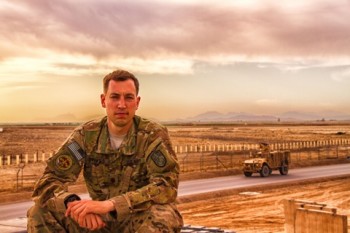Jesse Ehrenfeld '00: A Physician Serves His Country

Details
Less than a week into his tenure, Secretary of Defense Ashton Carter visited Kandahar Airfield in Afghanistan for a town-hall meeting with the troops then quickly made headlines with his positive response to a sensitive issue brought up by Lieutenant Commander Jesse Ehrenfeld '00.
“What are your thoughts on transgender service members serving in an austere environment like this, here in Kandahar?” asked Ehrenfeld. (While there are an estimated 15,000 transgender people in the military, they cannot “come out” as trans. Currently, Department of Defense rules require that transgender troops be discharged from military service. Until Ehrenfeld asked his question, Carter hadn't publicly stated where he stood on the issue. “I don't think anything but their suitability for service should preclude them [from serving],” he said.)
“If the transgender service member who was sitting next to me got up and asked that question, it would have effectively outed him and potentially been the end of his career,” says Ehrenfeld, a Navy Reserve doctor recently returned from a seven-month deployment to Afghanistan, where he worked with a multinational medical team treating coalition soldiers in a state-of-the-art, rocket-resistant trauma hospital in Kandahar.
“To be able to stand up and ask that question was uncomfortable, yet it was the right thing to do,” he says. “And in many ways, that's something I learned at Haverford: Confrontation isn't supposed to be easy or comfortable, yet it's critically important to do in many aspects of our lives.”
Inspired by two of his residency mentors at Massachusetts General Hospital who served in the military, Ehrenfeld, 36, joined the Navy seven years ago, toward the end of medical-school training.“I always figured if I ended up deployed I'd rather be on a ship than in the middle of the desert, and look what happened,” he says, smiling.
The Delaware-born physician anesthesiologist comes from a long line of veterans; his father was a U.S. Army dentist, one grandfather served in the Merchant Marines and the Army, another grandfather was also an Army man, and an ancestor was a Revolutionary War medical officer. “I always felt the desire to give back to my country in a meaningful way,” he says.
The easy-going Ehrenfeld is a bit of an anomaly. An openly gay doctor and service member whose partner, Judd, is an administrative judge, he's also a Republican and staunch fiscal conservative who believes in a strong military. “I think it's important to educate my fellow Republicans who aren't quite there on the issues,” he says. “But I'm not ready to give up on the party.”
Clearly comfortable in his own skin, Ehrenfeld came out during his sophomore year at Haverford, though he wasn't sure how people would react. “I found out it was definitely easier to be a gay man than a Republican at Haverford,” he says with a laugh.
A leading advocate for lesbian, gay, bisexual and transgender patients, Ehrenfeld is also the youngest member of the American Medical Association Board of Trustees and serves on numerous other medical governing boards. He's a prolific speaker and author--he's co-written 12 medical textbooks and published more than 60 peer-reviewed manuscripts. And his academic and professional accolades range from chemistry student honors at Haverford, to his M.D. from the University of Chicago-Pritzker School of Medicine, to his master's of public health from Harvard.
When he isn't deployed, Ehrenfeld is an associate professor of anesthesiology and surgery at Tennessee's Vanderbilt University School of Medicine, where he also practices and runs the health informatics division. His group takes vast amounts of patient data, then creates analytical models to understand how to provide better care before, during, and after surgery. That has led, for example, to reducing postsurgical infections in diabetic patients.
As a leader in the field, Ehrenfeld frequently gives talks to military and civilian health-care professionals on LGBT health issues.“Studies have shown that many in the LGBT community delay or don't seek care because they're fearful of discrimination and bias. So I emphasize with students and health-care workers to be welcoming and warm to all of our patients, or they won't come and see us.”
About his recent deployment, Ehrenfeld says it was challenging:“Leaving my family and going to a far-off place to practice medicine in an austere environment, working under circumstances that were unusual and difficult at times it made me uncomfortable, and you have to be OK with that.”
--Anne Stein


